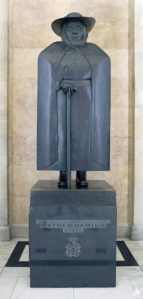 Preparing to preach yesterday on the Feast of St. Damien of Molokai, I found one of those historical incidences that appealed so much to my various sensibilities that I just had to share it.
Preparing to preach yesterday on the Feast of St. Damien of Molokai, I found one of those historical incidences that appealed so much to my various sensibilities that I just had to share it.
It seems that not long after Father Damien’s death, a certain Protestant clergyman in Hawaii, named (interestingly, as you’ll see) Hyde, set out to describe Damien to a colleague, and his comments were made public. He wrote:
“In answer to your inquiries about Father Damien, I can only reply that we who knew the man are surprised at the extravagant newspaper laudations, as if he was a most saintly philanthropist. The simple truth is, he was a coarse, dirty man, headstrong and bigoted. He was not sent to Molokai, but went there without orders; did not stay at the leper settlement (before he became one himself), but circulated freely over the whole island (less than half the island is devoted to the lepers), and he came often to
Honolulu. He had no hand in the reforms and improvements inaugurated, which were the works of our Board of Health, as occasion required and means were provided. He was not a pure man in his relations with women, and the leprosy of which he died should be attributed to his vices and carelessness. Others have done much for the lepers, our own ministers, the government physicians, and so forth, but never with the Catholic idea of meriting eternal life.”
This letter received a rather strong and lengthy response by the author Robert Louis Stevenson (of Treasure Island and Jekyll and Hyde fame) in the form of an open letter. It’s an often harsh, but also quite inspiring response in defense of the saint, calling the clergymen out for his jealousy (worth reading the whole of):
“But, sir, when we have failed, and another has succeeded; when we have stood by, and another has stepped in; when we sit and grow bulky in our charming mansions, and a plain, uncouth peasant steps into the battle, under the eyes of God, and succours the afflicted, and consoles the dying, and is himself afflicted in his turn, and dies upon the field of honour – the battle cannot be retrieved as your unhappy irritation has suggested. It is a lost battle, and lost forever.
One thing remained to you in your defeat – some rags of common honour; and these you have made haste to cast away. Common honour; not the honour of having done anything right, but the honour of not having done aught conspicuously foul; the honour of the inert: that was what remained to you. We are not all expected to be Damiens; a man may conceive his duty more narrowly, he may love his comforts better; and none will cast a stone at him for that. But will a gentleman of your reverend profession allow me an example from the fields of gallantry? When two gentlemen compete for the favour of a lady, and the one succeeds and the other is rejected, and (as will sometimes happen) matter damaging to the successful rival’s credit reaches the ear of the defeated, it is held by plain men of no pretensions that his mouth is, in the circumstance, almost necessarily closed.
Your Church and Damien’s were in Hawaii upon a rivalry to do well: to help, to edify, to set divine examples. You having (in one huge instance) failed, and Damien succeeded, I marvel it should not have occurred to you that you were doomed to silence . . .”
Stevenson basically says what can be said of many—if not most—saints: He may not have been perfect, but he served more faithfully and lived more heroically than most of us. Reason for silence indeed.
(Above photo is of the statue of Damien which stands in the U.S. National Statuary Hall)



















